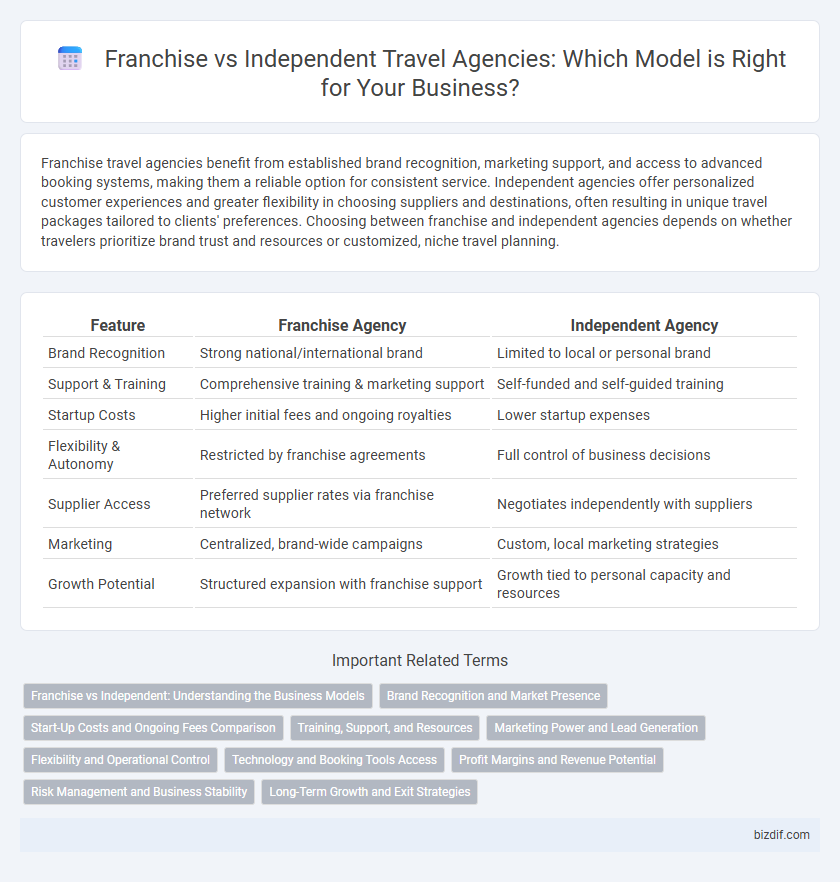Franchise travel agencies benefit from established brand recognition, marketing support, and access to advanced booking systems, making them a reliable option for consistent service. Independent agencies offer personalized customer experiences and greater flexibility in choosing suppliers and destinations, often resulting in unique travel packages tailored to clients' preferences. Choosing between franchise and independent agencies depends on whether travelers prioritize brand trust and resources or customized, niche travel planning.
Table of Comparison
| Feature | Franchise Agency | Independent Agency |
|---|---|---|
| Brand Recognition | Strong national/international brand | Limited to local or personal brand |
| Support & Training | Comprehensive training & marketing support | Self-funded and self-guided training |
| Startup Costs | Higher initial fees and ongoing royalties | Lower startup expenses |
| Flexibility & Autonomy | Restricted by franchise agreements | Full control of business decisions |
| Supplier Access | Preferred supplier rates via franchise network | Negotiates independently with suppliers |
| Marketing | Centralized, brand-wide campaigns | Custom, local marketing strategies |
| Growth Potential | Structured expansion with franchise support | Growth tied to personal capacity and resources |
Franchise vs Independent: Understanding the Business Models
Franchise travel agencies benefit from established brand recognition, centralized marketing support, and access to preferred vendor deals, which can reduce startup risks and operational costs. Independent agencies offer greater flexibility in customizing services, selecting suppliers, and building unique brand identities, allowing for personalized client experiences and entrepreneurial control. Choosing between franchise and independent models depends on priorities such as financial investment, autonomy, and long-term growth strategies in the competitive travel industry.
Brand Recognition and Market Presence
Franchise travel agencies benefit from established brand recognition and a broad market presence, leveraging nationwide marketing campaigns and trusted brand reputations to attract clients. Independent travel agencies often face challenges building brand awareness but can differentiate themselves through personalized services and niche market expertise. Strong brand recognition in franchise agencies typically results in higher customer trust and a more extensive network of suppliers and partners.
Start-Up Costs and Ongoing Fees Comparison
Franchise travel agencies typically require higher start-up costs, often ranging from $10,000 to $50,000, due to brand licensing fees and training expenses, whereas independent agencies may start with lower initial investments but assume full responsibility for marketing and technology setup. Ongoing fees for franchise agencies usually include monthly royalty payments averaging 5% to 10% of gross sales, while independent agencies retain all profits but must cover all operational and advertising costs independently. Careful evaluation of these financial commitments is essential for agents considering long-term sustainability and growth potential in the competitive travel industry.
Training, Support, and Resources
Franchise travel agencies benefit from comprehensive training programs and ongoing support provided by the parent company, ensuring consistent service standards and access to extensive marketing resources. Independent agencies customize their training and resource acquisition, allowing for greater flexibility but requiring more self-driven effort to stay updated with industry trends. Both models offer unique advantages in professional development, with franchises providing structured support and independents fostering personalized growth strategies.
Marketing Power and Lead Generation
Franchise travel agencies benefit from established brand recognition and centralized marketing campaigns, resulting in higher lead generation and broader customer reach. Independent agencies rely heavily on local networking and personalized marketing strategies, which can limit exposure but foster stronger client relationships. Harnessing the marketing power of a franchise often translates into consistent leads, while independent agencies must invest more effort into innovative lead generation techniques.
Flexibility and Operational Control
Franchise agencies often offer a structured business model with established branding and support, but they limit flexibility through strict operational guidelines. Independent agencies enjoy greater autonomy in decision-making, allowing customized services and marketing strategies tailored to local client needs. Operational control is maximized in independent agencies, enabling rapid adaptation to market trends and personalized customer experiences.
Technology and Booking Tools Access
Franchise travel agencies benefit from advanced technology platforms and comprehensive booking tools provided by their parent companies, ensuring streamlined operations and access to negotiated supplier rates. Independent agencies often rely on third-party booking systems that may lack integration, limiting efficiency and competitive pricing options. Technology investments in franchise setups enable real-time inventory management and automated customer relationship tools, enhancing service delivery and booking accuracy.
Profit Margins and Revenue Potential
Franchise travel agencies benefit from established brand recognition and support, often resulting in higher and more stable profit margins due to shared marketing costs and bulk supplier discounts. Independent agencies enjoy greater control over pricing and service offerings, potentially leading to higher revenue growth, but they face increased operational expenses and marketing challenges that can compress profit margins. Balancing brand leverage with operational autonomy is key to maximizing revenue potential and sustaining profitability in competitive travel markets.
Risk Management and Business Stability
Franchise travel agencies benefit from established brand recognition and corporate support, which bolster risk management through shared resources and proven operational protocols, enhancing overall business stability. Independent travel agencies face greater exposure to market fluctuations and financial uncertainties but maintain flexibility in decision-making and niche market targeting. Effective risk management in both models requires tailored strategies, with franchises leveraging system-wide protections and independents emphasizing agility and personalized customer relationships.
Long-Term Growth and Exit Strategies
Franchise agencies benefit from established brand recognition and support systems, accelerating long-term growth through proven business models and marketing resources. Independent agencies offer greater flexibility and control, allowing personalized strategies that can adapt to market changes and build unique brand value over time. Exit strategies for franchise agencies often involve resale within the brand network, while independent agencies may pursue acquisition or merger opportunities to maximize returns.
Franchise agency vs Independent agency Infographic

 bizdif.com
bizdif.com